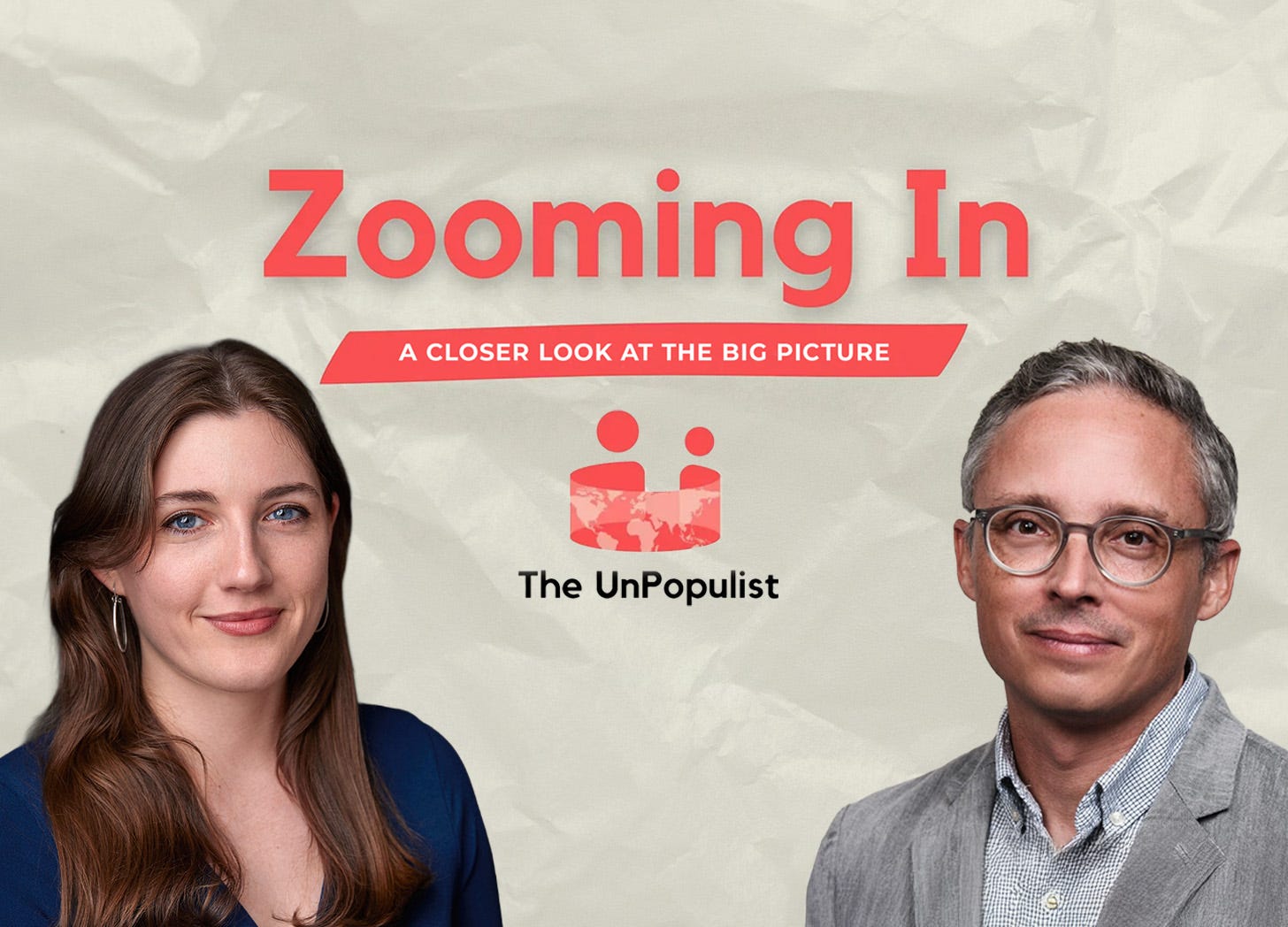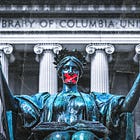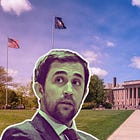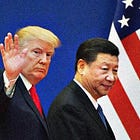Listen to Zooming In at The UnPopulist in your favorite podcast app: Apple Podcasts | Spotify | Google Podcasts | RSS | YouTube
Landry Ayres: Welcome back to Zooming In at The UnPopulist. I’m Landry Ayres.
For decades, American universities have been seen as bastions of free inquiry, attracting students and scholars from around the world. But what happens when this openness creates vulnerabilities? How do authoritarian regimes leverage financial ties and international student populations to stifle criticism and export censorship onto American campuses? And more urgently, are we now seeing these same tactics of intimidation and financial pressure being used by our own government to bring higher education to heel?
To explore these questions, host Aaron Ross Powell is joined by guest Sarah McLaughlin, a senior scholar of global expression at the Foundation for Individual Rights and Expression (FIRE), and author of Authoritarians in the Academy: How the Internationalization of Higher Education and Borderless Censorship Threaten Free Speech.
They discuss the levers of power that governments—like China—use to pressure universities, from threatening the flow of tuition-paying students to direct transnational oppression of students on U.S. soil. They also examine why so many academic institutions—in the face of these threats from both foreign and domestic actors—have chosen silence and capitulation over courage.
We hope you enjoy.
A transcript of today’s podcast appears below. It has been edited for flow and clarity.
Aaron Ross Powell: Our conversation today is about the dangers of an authoritarian regime exercising influence over universities, with the goal of shutting down speech it deems too critical or otherwise objectionable. But we’re not talking about the Trump administration. We’re talking about China. Can you start by explaining why it’s worth talking about China’s actions at a time when Trump’s actions feel more pressing?
Sarah McLaughlin: One thing I talk about a lot in the book is the levers of power that authoritarian regimes can exert over higher education, and over the people within them. It’s important that we understand that, because we’re seeing some of those same levers exerted right now, primarily when we look at international students and at funding to universities.
The issue of international students is especially relevant here, because of the threats to international students’ rights, and the ways that governments like China’s can use the financial benefits that those students offer as a way to punish or reward universities. We’ve absolutely been seeing that in the past few months. We’ve seen the Trump administration explicitly threaten to cut off universities’ access to tuition-paying students from overseas, students who often tend to pay more than citizens. That’s exactly the kind of thing that we have seen the Chinese government threaten, and in some cases actually act on. So we need to understand that there are parallels between how governments operate.
Ultimately this is about governments trying to exert control over institutions and civil society, especially universities. A lot of the book is about China, but that’s not because China is the only authoritarian country; it’s just because—for a number of reasons—the Chinese government has been successful in its interference in higher education. But these are avenues and strategies that are open to any government that wants to exert its will on people.
We need to react to them, because the more we allow these kinds of pressures to successfully influence speech and expression, the more we’re going to see them. That is as true as it can get when it comes to what’s been happening in the past eight months here in the U.S., because what we’ve been seeing is efforts that have in many cases gone uncontested, and we’ve seen more and more of them because they’re working. That’s exactly the risk here.
Powell: Can you give us a sense of the spread of foreign students in universities? To what degree are universities dependent upon foreign students? How many are there? Is this something that’s concentrated in elite universities, or does this impact all universities? Then we can get into how this is exercised against the universities.
McLaughlin: International students make up about 6% of the student population in the United States. In some universities, especially private and elite ones, international students can make up a significant portion of a university body, especially in certain programs. There are some universities where 40% of the student population might be international. And I don’t think that’s a bad thing. International students provide a lot of experience to their classmates, which I think is a good thing. It’s more conducive to knowledge production and better conversations when you have people from all different parts of the world and all different backgrounds meeting and teaching each other, because I think that’s how we advance our understanding of the world. So I don’t think there’s anything inherently bad about that.
“We’ve seen the Trump administration explicitly threaten to cut off universities’ access to tuition-paying students from overseas, students who often tend to pay more than citizens. That’s exactly the kind of thing that we have seen the Chinese government threaten, and in some cases actually act on. So we need to understand that there are parallels between how governments operate.” — Sarah McLaughlin
But there are unique stressors that accompany having students from authoritarian regimes in higher education. The problem is not the presence of those students; the problem is the lack of understanding and acknowledgement and care for the specific free speech concerns that are going to come with those students.
Powell: These students pay full tuition, so they’re a big chunk of a university’s budget, in contrast to how most American students get some sort of discount on their tuition. There’s often a lot of prestige there. What are the means by which foreign regimes then use this? What are the various levers they have to pull, besides the obvious one of no longer allowing students to come to the university? Are there other levers they can use to exert their will?
McLaughlin: Obviously, as you mentioned, the primary one is cutting off access to those students. That’s something that we’ve seen the Trump administration threaten. The reason why they’re threatening it is because it can severely impact a university.
There have been isolated cases where the Chinese government has acted on that. There was a Canadian university whose diplomas were de-recognized within China after they hosted the Dalai Lama as a speaker. You’re not always going to have direct threats. You’re not going to have, in every case or in most cases, a clear follow-through between speech that’s allowed or invited and a punishment or consequence. But you’ll know that that consequence is possible and can take place. That is one lever.
There are also the financial relationships that universities have with foreign governments, which go beyond just the students themselves. There’s a lot of money that comes into universities from foreign governments, from state-linked companies, from institutions overseas. There are also direct threats to these students themselves. It may not bother a university if their students are facing transnational oppression, but it may also influence how a university responds to it, if they do want to protect their financial ties overseas. There’s not much of a mystery why a university might not be willing to fully and openly acknowledge the threats that the Chinese government poses to their students, when the university is getting millions and millions of dollars from hosting a satellite campus in that country.
I’ve been especially disturbed by the student experience, because I don’t think that students have been getting the resources or attention they need. In many cases there’s probably a financial reason why universities are not providing, or acknowledging why students may need, that assistance. I’ve spoken to students whose parents have been brought in for questioning because they took part in protests here in the United States. Their social media has been surveilled. They’ve been threatened by police officers who have called them directly from China. They’ve received threats from consular officials, even from their fellow students in some cases. I’ve spoken to students who are hoping they can find employment in the U.S. because they don’t think they can safely return home to China. We’re creating a class of students who come to the United States—with the caveat that over the past eight months, it’s a very different question—that are being welcomed into an environment where they’re promised the ability to fully participate with their peers in the free exchange of ideas, in protest, in research, and they’re finding that they actually don’t have those same freedoms as their peers here, and that they don’t really think universities care or are interested in investigating why that’s happening.
To my knowledge, only a couple of universities have even acknowledged that their students have faced, in some cases, death threats or harassment simply because they posted things on the internet that are just basic political expression.
Powell: Is the typical university response just silence? Or do we ever see them defend their decision to capitulate to China, or whomever else, over the needs of a student?
McLaughlin: In many cases, it is silence and non-acknowledgement.
One of the rare responses that did come through was at Purdue University. There was really good ProPublica reporting about a student who faced both transnational oppression and pretty severe harassment from his peers on campus because he attended a Tiananmen Memorial and was speaking about it online at his campus. And Purdue, after there was blockbuster reporting on that, responded; they said it is unacceptable to threaten international students for violence because they speak up.
But for the most part, we have not seen those kinds of responses. In isolated cases, we’ve actually seen universities participate in the censorship of these students, like at George Washington University.
“I’ve spoken to students who are hoping they can find employment in the U.S. because they don’t think they can safely return home to China. We’re creating a class of students who come to the United States and are being welcomed into an environment where they’re promised the ability to fully participate with their peers in the free exchange of ideas, in protest, in research, and they’re finding that they actually don’t have those same freedoms as their peers here, and that they don’t really think universities care or are interested in investigating why that’s happening. To my knowledge, only a couple of universities have even acknowledged that their students have faced, in some cases, death threats or harassment simply because they posted things on the internet that are just basic political expression.” — Sarah McLaughlin
When it comes to whether universities have openly acknowledged their decision-making, I think there’s a pretty obvious reason why universities are not going to say that they have capitulated to the Chinese government. But we actually have seen a few of these statements over time. At NC State, for example, they disinvited the Dalai Lama explicitly because of the political concerns that would come with it. They said that they needed to protect the university’s relationship with the Chinese government, and they felt they had a broader duty to protect the state of North Carolina’s relationship as a trading partner with China. At Harvard Law, there was a Vice Dean who forced a Chinese dissident to cancel an event about human rights in China, because it would coincide with the president of Harvard’s trip to China to meet Xi Jinping to advance the university’s interests there. He specifically said it would embarrass the university to be hosting this kind of event.
There are pretty clear justifications on the university side of this: they’re looking at it as a financial question, not as a question of values. “It’s what is best for our university’s finances.” You can see these same trends over the past eight months here in the U.S. Universities are making what they think is a wise financial decision. I don’t think it is; I think there’s clear evidence that the more you capitulate to this administration, the more you’re going to suffer. But they’re not making values-based decisions. If they had been, over the past eight months and for the past decade, I think we would be in a better situation with higher ed than we are now.
Powell: I was going to ask about exactly that. I think it’s been shocking for a lot of people watching how many major universities are not standing up to the Trump administration. It’s not all, some are standing up to the Trump administration and we should all be praising them for that, because it appears to be something that’s taking a lot of courage. But given the ones that haven’t ...
McLaughlin: Harvard has. Harvard’s done an incredible job. But outside of that, yes.
Powell: Columbia is a very good example of just how groveling a university can be. It’s been surprising to a lot of people how quickly they backed down, especially given that we’ve seen when the funding cuts are challenged in court, the universities typically win. The ones that fight back seem to be doing okay, but there’s been this capitulation. This has been a trend in the second Trump administration, with many institutions backing down immediately. It seems surprising, because we think America holds free speech and freedom of expression and our political freedom in very high regard. This is central to the American identity. And yet, at the first bully who says he’s going to hurt you if you don’t do what he wants, everyone gives in.
Is part of the problem that the universities are so practiced in capitulation, in ways that most of us haven’t been paying attention to? Most people were not really paying attention to China and other regimes doing things at the universities. Is their default operating behavior that when someone threatens their finances, they give in?
McLaughlin: Yes, and even if you want to remove this from the question of China or even free expression more broadly, this is a problem with how universities have changed. Universities have become much more bureaucratic institutions that have much bigger administrative bodies. If you look at the rates of administrators versus faculty and students, the administration is skyrocketing, and you’ve also had during that time the decline of tenure and the rise of adjunctification. You have a significant rise in the presence of people who are going to care most about the university’s branding and the university’s financial prospects. And you also have a significant decline in the presence of people who feel protected to advocate for their rights, which in this case is primarily going to be faculty members who are rightfully going to be the best advocates, and the most concerned about academic freedom.
Many of the academics I’ve spoken to, whether it’s about Israel-Palestine issues in the U.S., or about other free speech issues, or about China, do not feel that they have the freedom to speak their minds about how their universities operate. Even tenured professors often feel that, at this point in time, tenure is not enough of a protection for them to speak their mind. There’s a lot of pressure on academics to self-censor because they don’t think they have the job protections to speak out. They also know that the job market for academics is a bit nightmarish, so the thought of losing your job is really terrifying in the academy, if you spend all these years working towards being an academic and then you get fired because you say you don’t think your university should capitulate to the Trump administration or to the Chinese government.
Those factors have really been exacerbating this, because the people who have the most power right now are the ones who are significantly less concerned about weighing the university’s values over the university’s financial prospects. One of the reasons why Harvard may have been almost forced to fight back is that the demands that were going out against Harvard were so constant and so extreme that I don’t think Harvard could have capitulated to that and stayed the university it wanted to be. For example, there were demands from Department of Homeland Security that the university hand over five years of any records they have about international students’ protests. It’s shocking that DHS was demanding that kind of surveillance and censorship of international students.
When you come here, we advertise our universities as a place for students to able to speak freely. And when you come here and you find out that that wasn’t the case for you, that that’s only for some students, it’s really disappointing. Not only because it goes directly against what we think American higher education should be, but also because it goes against what we think America should be more generally: a place where people can come and breathe free air, and feel that they, for the first time, might have the chance to speak their minds.
Powell: How did we get here? As you’re describing this, it sounds like this isn’t the way it always was. Universities didn’t always function this way, they didn’t always place immediate financial concerns above academic principles. They weren’t always as top heavy. What changed to shift us into the world that leads to all of this giving in?
McLaughlin: There are a lot of different factors. I’m sure people can point to a funding crisis: in higher ed more generally—we’ve had how many economic ups and downs? There’s already an incentive to be very careful about ensuring that universities can protect their finances.
“At NC State, for example, they disinvited the Dalai Lama explicitly because of the political concerns that would come with it. They said that they needed to protect the university’s relationship with the Chinese government, and they felt they had a broader duty to protect the state of North Carolina’s relationship as a trading partner with China. At Harvard Law, there was a Vice Dean who forced a Chinese dissident to cancel an event about human rights in China, because it would coincide with the president of Harvard’s trip to China to meet Xi Jinping to advance the university’s interests there.” — Sarah McLaughlin
Some academics I’ve spoken to have specifically pointed to the 2008 financial crisis as the point where higher ed changed, where they felt that money started to be more important than values. There’s been a lot of funding issues just from state governments, and I think it’s impossible to avoid the money question here. I don’t have the answers to this, but it seems that college is somehow too expensive for everyone, that it never has enough funding but people are also always paying too much for it. I don’t have the fix for that, but I do think that’s at the root of this.
Powell: It’s striking how widespread these attitudes are, given that most university administrators were professors and were elevated out of that background. And yet we seem to have developed this culture of extreme caution about finances. This is an issue that we see with other organizations that have given in.
ABC pulled Jimmy Kimmel from the air for some fairly measured remarks about the [Charlie Kirk] assassination. We have this culture where if you’re at the head of something big, your immediate financial concerns trump any other principles. Watching them give in, whether it’s to China or to the Trump administration, it’s like none of these people ever had run-ins with bullies before. They don’t understand that if you give the bully your lunch money, he doesn’t then stop bullying you. He comes back the next day.
McLaughlin: You’ve just proven to the bully that there’s someone he can get lunch money from, yes.
Powell: It’s astonishing how psychologically naive these responses are. Sometimes I wonder if it’s just that people have not adjusted to the fact that this particular administration is different, that it is an authoritarian regime that doesn’t operate in the way that prior U.S. administrations used to operate. It’s not a good faith actor.
China is not a good faith actor. The Trump administration is not a good faith actor, and the bad faith actors are simply different. But there’s a real hesitation in admitting that we’re in a different world. I wonder if there is a lack of courage that’s driving some of this. To belabor my bullying analogy, one thing that helps defeat the bully is when one or two people stand up to him and everyone else sees that it works. Do you think if Harvard wins out, that encourages other universities to have a bit more courage the next time demands come around?
McLaughlin: I absolutely hope so. One of the prescriptions I offer in the book, which I had finished writing late last year before anything had happened this year, is that we need to look to Harvard and Yale and to the universities that have the endowments to weather a storm. We need to be able to look to them to not censor, to not violate their community members’ rights. At the time I was talking about the Qatari government or the Chinese government, and now we’re obviously talking about the American government. But we need to be able to look to those institutions that have the means to stand by their values, because it makes it a lot harder to justify rolling over for this kind of pressure when someone has already said they’re not going to do that. When everybody does it, you have cover because this is just the state of things, this is how everybody is acting.
What’s been really interesting is the discussion among commentators and people on social media about whether we still have First Amendment rights. Yes, I think we do. But I’m not sure that’s even the question right now—the question right now is whether we have people who are willing to make a First Amendment case, who are willing to go to court to defend their rights. The protections that we have are only really important if anyone’s willing to cite them in their defense. If you constantly roll over, if you’re a Columbia, if you’re an ABC, if you’re one of the many law firms that sign an agreement, then it doesn’t matter if you have those rights if you’re not willing to stand up for them.
Ultimately, we’re having a crisis of courage more than anything else. When people do that, they’re hurting all of us, because they’re not making the case, they’re not setting the precedent. And so we need the Harvards, and we need the Harvards in every industry and every part of civil society, because we’re not going to able to fix this without them.
Powell: I’m curious how China and the other international regimes we’re talking about have responded to what’s happening with the Trump administration. On the one hand, you can tell a common story that these are all authoritarian regimes that don’t like speech that is critical of them, and therefore they are trying to shut down or harass or intimidate or threaten students who are saying things that they don’t like, or research programs that are advancing research questions they’re not happy with. But one thing that stands out is that a lot of the foreign students from these various countries are coming here for science and engineering-type training. Our universities are the best in the world at training scientists and engineers and computer scientists and so on, so they have a strong interest in those kinds of programs and that kind of research, because what they want is their students to come over here, learn all of the great things that our universities have to teach, and then go and bring that knowledge back. But the Trump administration is really going after those programs; they’re pulling the science funding.
McLaughlin: And there have been a lot of efforts to say they don’t want Chinese students studying STEM. They can come here for other things, but they can’t study STEM.
Powell: Yeah, so you have this weird divide between the pro-STEM side that’s exercising authoritarian influence and the Trump administration being profoundly anti-STEM. All throughout this, RFK Jr. is the least STEM guy you could possibly imagine. How have we seen China or other regimes respond to this, and pushing back against Trump’s actions?
McLaughlin: You know, I admit that I haven’t seen—and I may have just missed it in the chaos of the past eight months—a specific response on that front, regarding STEM and regarding Chinese students’ access to it here.
“What’s been really interesting is there’s a lot of discussion among commentators and people on social media about whether we still have First Amendment rights. Yes, I think we do. But I’m not sure that’s even the question right now. The question right now is whether we have people who are willing to make a First Amendment case, who are willing to go to court to defend their rights. The protections that we have are only really important if anyone’s willing to cite them in their defense. If you constantly roll over, if you’re a Columbia, if you’re an ABC, if you’re one of the many law firms that sign an agreement, then it doesn’t matter if you have those rights if you’re not willing to stand up for them. Ultimately, we’re having a crisis of courage more than anything else. When people do that, they’re hurting all of us.” — Sarah McLaughlin
But I do recall one notable response about what’s happening in the U.S., and in some European nations, too. It was about the Jimmy Lai trial in Hong Kong, who is the media mogul who’s being targeted by the Hong Kong government because he ran Apple Daily, a paper that posted pro-democracy material. One of the judges in his trial specifically pointed to censorship happening in the U.S. right now to say that every country has its own standards for free expression and this isn’t so different from what the United States is doing.
So, on a broader level, I think we’re offering a gift to authoritarian regimes as we descend into becoming a less free country. If you look at the United States, even though we’ve had problems on free expression, our First Amendment is very strong; it’s stronger than speech laws around the world. Those countries can point to what’s happening in the U.S. and say that even the U.S. does this, so who are you to criticize our censorship? We’re just doing what any sovereign power has to do to protect itself against dangerous speech.
The more we use these national security justifications, the more we’re going to see our own behavior cited overseas for authoritarian acts that are being approved by courts. That’s a real tragedy, and it should cause some reflection on our part, but I don’t know that reflection is our strong suit at the moment.
Powell: You had previously mentioned the incident at George Washington. Could you talk about that in more detail, because it really stood out as fairly horrific, and as a good example of what this actually looks like on the ground for students.
McLaughlin: In 2022, shortly ahead of the Beijing Winter Olympics, there were some students who posted artwork by a Chinese-Australian dissident artist. They were meant to look like promotional posters for the Olympic Games, but once you looked closer at them, you realized that instead they were highlighting China’s human rights abuses, and perhaps implying that the Chinese government should not be allowed to host the Olympic Games because of the human rights issues in the country, especially when it comes to Tibetans and Uyghurs and Hong Kong. Students anonymously put these flyers up, and almost immediately after, some student groups started to complain to the George Washington administration. They said that these posters promoted hate, that they were an insult to the Chinese nation and to the Olympic spirit. And they said that George Washington had a responsibility to act. I strongly disagree with what those students were demanding, but students have the right to ask for those things even if they’re illiberal or counterintuitive or wrong.
But what happened next, how the university responded, was even worse. George Washington’s president at the time said that he was personally offended by those posters and that he was going to have them removed, which he did. He also said that he was going to have the university investigate to see who put them up. I found out that the university actually did start reviewing security footage to see who put up these posters criticizing the Chinese government. It’s shocking, and at the time I was writing about it and calling on George Washington to stop this madness.
I told them that if there were students who were from Hong Kong or China who had put those flyers up, the university could be directly responsible for creating a trail that puts them in serious legal peril, and puts their families in legal peril at home in China. And it turned out to be exactly the case. There was a group of students who continued to hold protests and events about China at GW and other D.C.-area universities. There were students who were from Hong Kong and from China who had put up those flyers. I interviewed those students, and they felt really personally wronged by the university. They felt that not only was this American university—that they were paying—participating in the kind of censorship that they tried to leave behind at home, they also felt that in a more complex manner the university was picking sides when it came to questions about what’s okay to say about China, and what even Chinese students are allowed to say about their own government. They rightfully felt very wronged by that.
To his credit, GW’s president admitted he made a mistake. I don’t want to criticize someone so harshly that they lose the incentive to admit when they were wrong. But I think he created some harm there that could never really be repaired. Those students could no longer trust not only that their universities wouldn’t censor them, but that they wouldn’t start a campus police investigation to unmask them for punishment.
Not every case has been as severe as that, and there have been a lot of demands for censorship at universities from some student groups who tend to be more supportive of the Chinese government. But, more broadly, students are operating in a culture where they feel like their peers are constantly trying to get them censored and silenced for criticizing the Chinese government, and they sometimes think that they can effectively use the university administration as a middleman to achieve that.
Powell: This has clear parallels to the experience of students protesting the war in Gaza, and the way that universities responded to that as well. Can you tell us about what FIRE has been doing in this environment with the actions by China, other governments, and now the Trump administration?
McLaughlin: We recently announced a lawsuit against Secretary of State Marco Rubio, specifically targeting the provisions of the Immigration and Nationality Act that Rubio is using to target students like Rümeysa Öztürk and Mahmoud Khalil, and to use his personal discretion to decide what kind of speech international students engage in that is a threat to American foreign policy interests, and for that reason they need to be removed.
“If your university just becomes something that serves the interest of the state, how much of a university is it anymore at that point? We need to be willing to make hard sacrifices for these values. And we can reward and encourage universities that do, because sometimes you need to praise behavior to make sure you get more of it. So we need to praise and encourage the Harvards who are standing up for themselves. … I argued was that universities need transparency when it comes to their dealings with foreign governments, and now we also need transparency when it comes to universities’ dealings with the Trump administration.” — Sarah McLaughlin
Ultimately, we are in a situation now where you can have two students saying the same things on a campus, but because one of them is on a green card or a visa, they can be taken by masked officers and put in an unmarked van and taken to an ICE facility. That’s unacceptable. That is not what a free country should look like.
This is a really important lawsuit, because we’re making the case that the First Amendment is for everyone in the United States. You don’t lose access to it just because you’re not a citizen. I don’t think that’s what we want our country to look like; that looks more like the governments I criticize in my book rather than the one I want to live in.
Powell: What do we do about all of this? Given that you and I, and the listeners of The UnPopulist podcast, cannot change the regime in China, or the regimes in the Middle East that are acting in similar ways, or change the Trump administration, what actions can universities and others be taking now? Are there lessons from prior experience with other authoritarian regimes that apply in this moment? Are there things that have worked? Are there things that haven’t worked? Are there ways that we can pressure universities to be better at responding? What’s the path forward given that we are stuck in this particularly toxic world for at least another three years?
McLaughlin: There’s two ways to look at this. The first is that some of the advice I give in the last chapter of my book has become significantly more difficult to deliver on because of the political situation here in the U.S. It’s a lot harder to say we’re willing to lose some foreign funding if it means standing up for our values when you’re also losing your domestic funding.
But I also think that some of the same advice that can help universities when it comes to censorship abroad can help them here. You need to be very clear that your values don’t have a price tag, that there isn’t a specific amount of money that you’re willing to receive to hand them over to any government, whether it’s the Qatari government or the American government or the Chinese government. That’s going to hurt, maybe a lot in some cases, especially for universities that don’t have massive endowments. But they need to be willing to say that universities exist for their values, and that if they don’t offer those values, what is the point of ensuring the survival of those universities in the first place? If your university just becomes something that serves the interest of the state, how much of a university is it anymore at that point?
We need to be willing to make hard sacrifices for these values. And we can reward and encourage universities that do, because sometimes you need to praise behavior to make sure you get more of it. So we need to praise and encourage the Harvards who are standing up for themselves.
Another thing I argued was that universities need transparency when it comes to their dealings with foreign governments, and now we also need transparency when it comes to universities’ dealings with the Trump administration. Do not have private, closed-doors meetings with the administration where you are, perhaps, selling out your community members’ rights. You have to act transparently, and you need to make sure people understand exactly what kind of deals you’re making, whether it’s in a contract for a Confucius Institute or a satellite campus or whether it’s how you’re settling some dispute with Trump. You need transparency, and you need values.
Perhaps the [greatest] difficulty arises in what to do with international students. Universities have, for a while, needed to do more to defend their international students. They need to make clear that they’re not going to put a relationship with a foreign power over a single student’s rights, because that student’s ability to speak really matters more than any paycheck that you’ll get. There’s a lot that they’ve needed to do on that front, to ensure that students know that their rights are protected, and to ensure that they know that they can go to leadership if they are facing some kind of rights violation, and that they won’t be ignored because their problems are inconvenient.
Now, with the different threats we’re facing to international students in the U.S., those same things still apply, but perhaps universities also need to see what they’re doing for international students who are facing deportation for engaging in protected speech. In some cases that might just mean coordination with that student’s legal team, and doing whatever that legal team needs. They need to make clear that they have been accepting these students’ money, that they’re an important part of campus community and that they’re welcome there, and that that can’t go out the window because they become a financial liability or a political liability.
© The UnPopulist, 2025
Follow us on Bluesky, Threads, YouTube, TikTok, Facebook, Instagram, and X.
We welcome your reactions and replies. Please adhere to our comments policy.



















